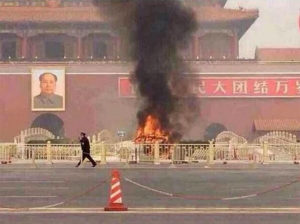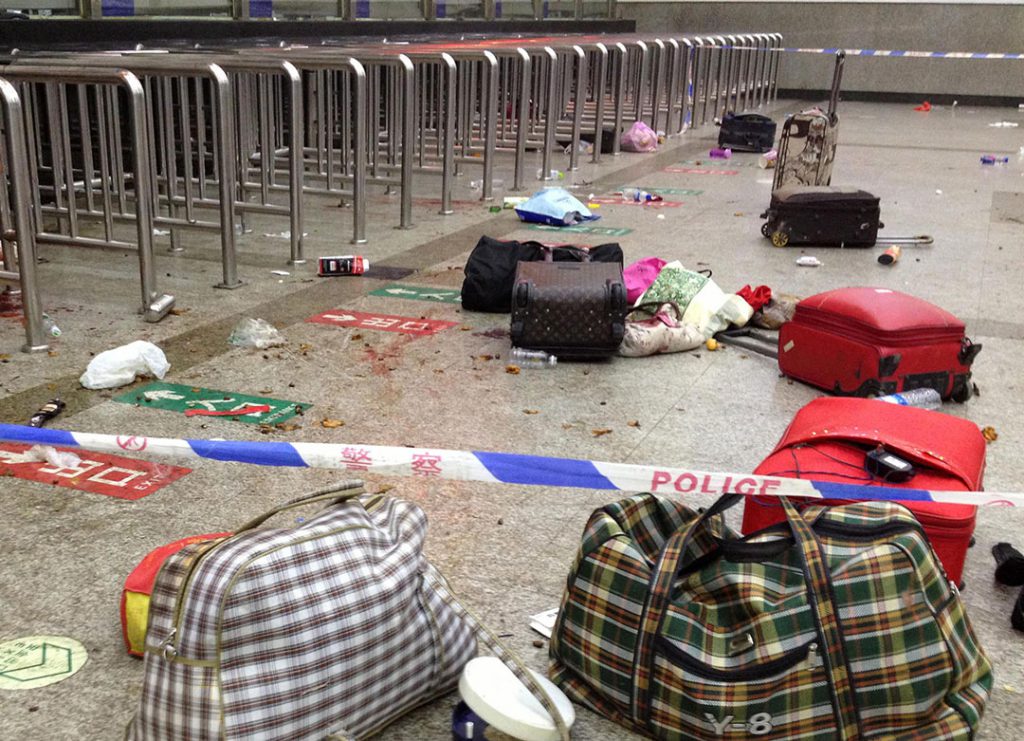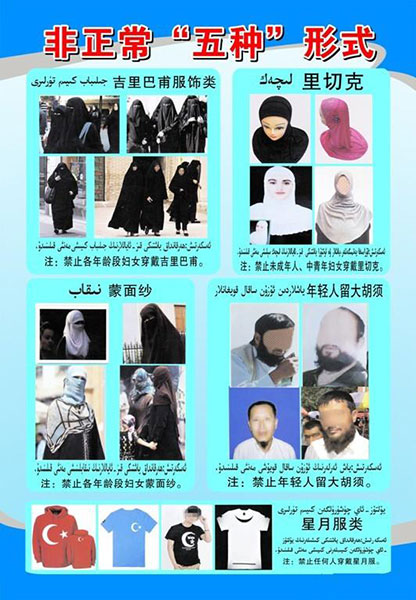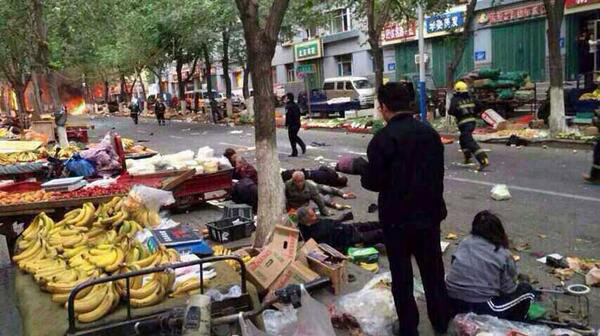
28 October 2013: Five people die when Usmen Hasan crashes into a crowd at Tiananmen Square
Photo: Weibo/thehindu.com
The last year has seen an unprecedented number of violent attacks in or linked to Xinjiang. These include attacks on civilians in railway stations and markets that were recorded on mobile phones and have been recognised by the international community (or at least US Secretary of State John Kerry) as terrorist attacks. The Chinese government sees these attacks as linked both to the Xinjiang independence and global jihadist movements. Below is a timeline of attacks and government responses.
28 October 2013: Deliberate Car Crash, Tiananmen, Beijing
A man later identified as Usmen Hasan 乌斯曼·艾山 crashes an SUV into a crowd of tourists and passersby at Jinshui Bridge in Tiananmen Square, killing two bystanders along with himself and two passengers in his vehicle — his wife and mother. Thirty-eight other people are injured in what official media call the first terrorist attack in Beijing’s recent history.
16 November 2013: Knife Attack, Seriqbuya 色力布亚
A violent incident in April 2013 results in the deaths of twenty-one people in Seriqbuya township near Kashgar 喀什 in Xinjiang. Authorities order a security crackdown. This prompts protests from the local Uyghur population against the harsh measures. According to Chinese media reports, on 16 November, nine Uyghur individuals, armed with knives and axes, storm the police station, and are shot dead. Two local police employees die in the attack, while another two are injured.
15 December 2013: Clash Between Police and ‘Terror Gang’, Kashgar
Police kill fourteen Uyghur members of what the Chinese Foreign Ministry calls a ‘violent terror gang’ near Kashgar; two police officers also die.
30 December 2013: Knife and Explosives Attack, Yarkand 莎车
According to regional government reports, ‘nine thugs carrying knives’ attack a police station, throw explosives, and set police vehicles on fire in Yarkand county near Kashgar. Eight of the attackers are shot dead and one is captured by police.
1 March 2014: Massacre of Civilians at Train Station, Kunming
At 9:20pm local time, a group of six male and two female assailants clad in all-black attire and armed with knives and cleavers rush into the ticket lobby of the Kunming Railway Station in Yunnan and indiscriminately attack civilians. The stabbing attack leaves twenty-nine civilians and four of the suspected killers dead, with one female assailant captured on the spot. Another 143 individuals (including seven police officers) are injured. On 3 March, China’s Ministry of Public Security announces that an additional three suspects have been arrested.

1 March 2014: Six male and two female assailants indiscriminately attack
civilians with knives and cleavers at Kunming Railway Station in Yunnan. The attack leaves twenty-nine civilians and four of the suspected killers dead
Photo: Xinhua/scmp.com
28 April 2014: Xi Jinping Visits Police and Villages, Kashgar
On 26 April, state media report that Xi Jinping has told a Politburo study session that the Chinese public must build a ‘wall of bronze and iron’ to fight terrorism, and ‘make terrorists become like rats scurrying across a street as everybody shouts “beat them!” ’. Two days later, he visits a Kashgar police station and a Uyghur village, and watches military counter-terrorism training at a nearby base.
30 April 2014: Suicide Bombing at Railway Station, Ürümqi
At 7:10pm on the final day of a four-day tour of Xinjiang by Xi Jinping, two assailants detonate suicide bombs at the exit of the Ürümqi South Railway Station, after initially attacking passengers with knives. The attack leaves three dead and seventy-nine others injured.
15 May 2014: Police Counter-terrorism Training, Xinjiang
Following Xi Jinping’s April visit to Xinjiang, China’s Ministry of Public Security selects thirty specialist officers from around the country to train local police in Xinjiang on counter-terrorism tactics and combat skills, including the use of weapons and emergency response training.
20 May 2014: Mass Sentencing Rally Ürümqi
The Xinjiang People’s Higher Court sentences thirty-nine people to prison terms of varying lengths for crimes including inciting ethnic hatred, organising terrorist groups and the illegal manufacture of guns.
22 May 2014: SUV Crash and Bomb Attack, Ürümqi
On 20 May 2014, police open fire in Aksu 阿克苏 prefecture in western Xinjiang on a crowd that has gathered to protest restrictions on religious attire. Two days later, five assailants in two SUVs fling explosives at shoppers on a busy street market in Ürümqi and run over passersby. Forty-three people are killed in the early morning attack, including four of the assailants, who die in a head-on collision between the two SUVs. More than ninety others are wounded, most of whom are elderly Han Chinese.
1 July 2014: Officials Banned From Fasting for Ramadan, Xinjiang
A number of government departments forbid Muslim civil servants from fasting during Ramadan. State-run media declare that the ban extends to party members, teachers and students, and expound upon the dangers of fasting. Such bans are not new, but state media give them special prominence this year.
28 July 2014: Mass Knife and Axe Attack, Yarkand
According to Xinhua, large groups of assailants attacked a police station and government offices in the neighbouring towns of Elixku and Huangdi in Yarkand county. Thirty-seven victims of the attack and fifty-nine of the attackers die, according to police, who arrest 215 other people. The government names Nuramat Sawut 努拉买提·萨吾提, leader of the East Turkestan Islamic Movement Uyghur separatist group as the mastermind behind the attack, and claim that the assailants had foreign assistance.
8 August 2014: Ban on Beards and Burkas, Karamay 克拉玛依
The majority-Han city in northern Xinjiang temporarily bans men with long beards as well as women wearing burkas, headscarves, and veils from taking city buses for the duration of a sporting event that finished on 20 August. The temporary restrictions also prohibit anyone wearing star and crescent symbols from taking public transportation.

Ban on beards and burkas in Karamay: The five so-called ‘five abnormal styles’ that were prohibited
Source: thatsmag.com
21 August 2014: Financial Rewards for Mixed Marriages, Xinjiang
As part of a trial effort to soothe ethnic tensions through assimilation, prefecture-level officials from various districts in Xinjiang offer annual payouts of 10,000 yuan for five years for mixed-race marriages between Uyghurs and Han Chinese.
1 September 2014: Rewards for Tip-offs, Ürümqi
Officials in Ürümqi announce a program of rewards of up to one million yuan for tip-offs from citizens that prevent large-scale terrorist attacks and activities.
21 September 2014: Bomb Attack on Market and Police Stations, Bugur County 轮台
Rioting mobs converge on an open-air market and two police stations in central Xinjiang, setting off explosives that kill ten people, including two police officers, two police assistants, and six bystanders, while injuring fifty-four others. The police response results in the deaths of forty of the attackers, who are either shot dead or take their own lives using explosives.
23 September 2014: Economics Professor Sentenced to Life Imprisonment, Ürümqi
The Intermediate People’s Court of Ürümqi sentences Ilham Tohti 伊力哈木·土赫提, a Uyghur professor of economics at Beijing’s Minzu University (formerly known in English as the Nationalities University), to life imprisonment on charges of separatism and inciting ethnic hatred. Ilham, who was detained in January, ran a Chinese language website that discussed social and economic issues facing Uyghurs and promoting Han-Uyghur dialogue.
12 October 2014: Knife and Bomb Attack on Market, Kashgar
Four Uyghur men attack a Han Chinese farmers’ market in Kashgar’s Maralbelxi 巴楚 county with knives and explosives, taking eighteen lives, including an unknown number of police officers. All four attackers are killed during the raid.



